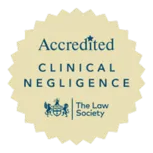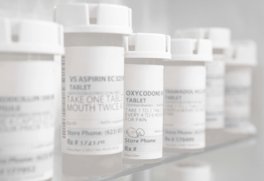
Carly Saxon-Garnett
Senior Associate Solicitor, Medical Negligence
A report following a public inquiry published in 2024 found that tens of thousands of people received contaminated blood and blood products through the NHS as far back as 1970. Our specialist team can provide you with legal advice and support if you've been affected. We have helped countless people claim millions in medical negligence compensation.
Blood transfusions can save the life of someone who has lost a large amount of blood due to a major trauma caused by an accident or surgery. They are also essential for people who have blood-related conditions such as haemophilia. In most cases, blood transfusions are performed without any problems. But if the blood or blood products received are contaminated or the transfusion is done negligently, the harm suffered by the patient can be life-changing. Our Medical Negligence Solicitors understand the shock, anger, and fear you may be feeling and will provide you with compassionate, sensitive, practical legal advice if you wish to claim compensation.
Although medical negligence is rare when it comes to blood transfusions, when it does happen, as can be evidenced in the contaminated blood inquiry, it can have tragic and fatal consequences. You or your loved one may have had to spend much longer in hospital than anticipated and might be suffering from long-term medical complications because of someone else's mistakes.
While we know that compensation cannot reverse what has happened, we could help you recover any lost earnings from the time you have had to take off work and access any specialist care and support you might need now and in the future. Our job is to support you in living the best quality of life you can by helping you access the compensation you deserve.
If you think you could claim compensation for blood transfusion negligence, contact us for a no-obligation Free Claims Assessment. We could visit you at home (in England or Wales), and we can usually deal with your claim on a No Win, No Fee basis.
Fill in the form below to get in touch with one of our dedicated team members, or call our team today on: 0800 260 5010

A blood transfusion is where donated blood or blood products/components are given to a patient through an intravenous line.
Blood components include:
Blood transfusions are given when someone has a shortage of red blood cells. Some of the reasons they are given include:
· The patient has lost blood due to an accident, childbirth complications, or injury.
· Blood has been lost during surgery.
· The patient has a disease such as anaemia, cancer, or Haemophilia.
The risks of receiving contaminated blood via a blood transfusion are now extremely low due to medical advances, clear guidelines, and better processes. That being said, a risk still exists. And between 1970 and the early 1990s, around 30,000 people were infected with Hepatitus C and HIV after receiving infected blood or blood products.




Blood can become contaminated when particles and diseases go undetected in the screening process. During the 1970s and 1980s, the NHS imported around 50 per cent of its blood and blood products from abroad. One of the countries that supplied blood was the USA. The US government paid people for donating blood and this meant some people with HIV or Hepatitus C donated blood. The NHS did not screen for these viruses until 1985 and 1991, respectively.
Donated blood goes through rigorous testing and handling to check it is uncontaminated and compatible with the person's blood type. Despite this, there are some cases where mistakes and oversights are made with blood transfusions – whether this is before the blood arrives at a hospital, or in the follow-up to the transfusion itself.
If you are given contaminated blood, you may get a blood-transmitted disease such as Hepatitis B or C, or HIV. Viral fevers that cause blood haemorrhages, for example, Ebola and Lassa Fever can also be transmitted, but this is extremely rare.

As with any medical procedure, doctors and medical professionals have a duty of care to protect you from unnecessary harm before, during, and after a blood transfusion. If they are found to have breached this duty of care, we could help you claim compensation. Here are some examples of processes medical professionals should follow when it comes to blood transfusions:
If any part of these processes fails, our specialist Medical Negligence Solicitors can investigate the situation fully to determine how the negligence happened and who was responsible so that we can secure you the compensation and justice you deserve.
Yes, and if you received a negligent blood transfusion in a private hospital, you can claim against that particular hospital.
You may be able to claim compensation if:
The Infected Blood Inquiry started in 2018 and has reviewed thousands of documents and testimonies from patients. It has been revealed that, in the 1970s and 80s, around 1,250 people with haemophilia and other bleeding disorders contracted HIV – and tragically about half of this group later died from an AIDS-related illness.
A further 30,000 NHS patients are thought to have contracted Hepatitis C - through the same contaminated treatment or a blood transfusion after surgery or childbirth. It is estimated around 2,050 of these people later died of liver failure or cancer caused by this contamination.
Following the conclusion of the inquiry in May 2024, the Infected Blood Compensation Authority (IBCA) has been established to deliver the Infected Blood Compensation Scheme, which will provide financial compensation to victims of infected blood on a UK-wide basis.




Yes, as well as accessing the Government compensation scheme, it's possible for you to make a civil claim. This applies whether you have been affected by contaminated blood or any other type of medical negligence involving a blood transfusion.
For many people, the recognition and sense of justice compensation brings are the most important parts of making a Medical Negligence claim.
Get in touch with our expert team today, who will find out everything we can about your situation and let you know about your legal and financial options so that you can achieve the best outcome for you and your family.
To ensure that you receive the maximum compensation you deserve through a No Win, No Fee claim, it's essential to understand the claims process. At Simpson Millar, we strive to make everything as straightforward and stress-free as possible, guiding you through each step with clarity and support.
The first step is to get in touch with our team of Personal Injury Lawyers. We offer a free initial consultation, during which we’ll discuss the details of your what happened when you received your blood transfusion, who you think was at fault, and the potential impact it has had on your life. This assessment helps us determine whether you have a valid claim. If we believe you have a strong case, we’ll move forward with your No Win, No Fee case.
With thorough investigation and evidence gathering, we can prove liability (fault) and strengthen your case. Our team will work with you to collect the evidence needed, depending on the nature of your case, such as:
Once all evidence has been collected, we will submit your claim to the NHS or private hospital’s insurer, asking them to accept responsibility for your injuries. This formal notification outlines the details of your injury, how it occurred, and the impact it has had on your life. We will also set out the amount of compensation being claimed, which covers:
If they admit responsibility, we can start negotiating an appropriate compensation settlement. If you have immediate financial or medical needs, we can ask for an interim payment of compensation to ensure you can access the support you need before the claim is fully settled.
If the other party denies responsibility or the compensation offer is too low, we may need to take your case to court. If this happens, we will continue negotiating to try and settle your case prior to court proceedings.
Most claims of this nature don’t get as far as court, but when there are no other options remaining our Personal Injury Solicitors have extensive experience in handling complex court cases, giving you peace of mind that your claim is in capable hands.
Once the claim has been settled, either through negotiation or court proceedings, you will receive your compensation. This is designed to cover all of the damages related to your injury, including medical treatment, rehabilitation, lost earnings, and the emotional impact of your injury, and we’ll make sure the compensation is paid as quickly as possible.




If you or a member of your family have been affected by treatment from infected blood, you may be able to get financial support from the England Infected Blood Support Scheme.
The scheme can help provide funding for:
Our Solicitors can also point you in the direction of support services we know and trust who can provide extra help if you need to talk to someone.
When it comes to the infected blood scandal that affected people in the 1970s to early 1990s this has been called the worst treatment disaster in the history of the NHS, and many of those who were infected had to give up their jobs and live on benefits because of their serious health problems. If you have been harmed by contaminated blood, whether during the time of the scandal or through a recent negligent transfusion, you may feel overwhelmed and uncertain about your future. Please know you are not alone, and support is available to help you during this challenging time.
All our medical negligence teams, including those who advise on Hospital Negligence Claims, Accident and Emergency Negligence Claims, and Fatal Medical Negligence Claims, are sensitive, compassionate, and dedicated to helping their clients get the compensation they need to move forward.
We're members of the Law Society's Clinical Negligence Accreditation Scheme and the Action against Medical Accidents (AvMA) Solicitors referral panel.
Our experience and reputation mean we have developed connections with many agencies and support services that can help you and your family if your life has been turned upside down due to negligent contaminated blood transfusion.
We’ve secured compensation for thousands of people in the past that have suffered medical negligence. Here are just two examples.

East Cheshire NHS Trust sends ‘sincere condolences’ for failings in Jack Hilton’s care. The parents of a young man with learning difficulties who died after doctors failed to diagnose him with sepsis have finally received a ‘proper letter of apology’ from the East Cheshire NHS Trust, two years after it admitted to failings in his care.

A boy who suffered brain damage at birth and went on to develop cerebral palsy as a result of delays in his delivery has today been awarded a compensation package worth in excess of £15million by the High Court.

Our client was being treated for Crohn’s disease but was prescribed the wrong medication, which reacted to elevated levels of creatinine in her blood. This was in breach of guidelines from the National Institute for Health and Care Excellence (NICE), and triggered chronic kidney disease
We may be able to offer you a No Win, No Fee agreement. This means you won't pay any money upfront for your legal fees, but you will have to pay for additional costs, known as Disbursements like court fees or expert reports fees. This can be covered by an insurance product called After the Event Insurance, which would cover these costs for you. Your case handler will provide more detail about this.
You'll sign a Conditional Fee Agreement or a Damages Based Agreement that says if you lose your case, you won't pay our legal costs. If you win your case, the other side will pay for a proportion of our legal costs, but you may have to pay for some of these yourself from your damages. This is usually capped at a percentage agreed in advance.
You'll usually have three years from when the negligence happened or from when you became aware of it to start your claim. This time limit may be extended in certain situations:
Although the Courts have wider powers to alter the time limits, they rarely do. This makes it best to seek legal advice as soon as possible if you think you have grounds for a negligent blood transfusion compensation claim.
Compensation can help you rebuild your life by easing financial pressure and allowing you access to care you may need in the future. If the NHS Trust or private hospital admits responsibility, we'll ask for an interim payment. This is compensation provided before a final settlement is reached so you can pay for rehabilitation, treatment, or any immediate costs you're facing.
Medical negligence compensation awards are split into two categories:
It is important to note that you'll likely receive more compensation if your civil claim is successful than you would through the Government compensation scheme.
In certain situations, you can bring a compensation claim on behalf of loved ones, including:
If your loved one has died due to receiving contaminated blood, you may be able to make a Fatal Medical Negligence Claim. Our Solicitors will provide you with the advice and representation you need compassionately and sensitively.
You'll need to provide details of your blood transfusion and give a personal statement as to how the contaminated blood has affected your life. We will also try and get witness statements from those who knew, or ought to have known, that the blood or blood products you were given were contaminated.
It is likely we'll have to instruct expert witnesses to give evidence to the Court regarding;
Whether you're claiming against a GP surgery, an NHS hospital or a private healthcare provider, you don't need to worry about taking money from their budget.
NHS Resolution deals with medical negligence claims for negligent or contaminated blood transfusion claims against the NHS, and private healthcare providers will have their own insurers.
In this situation, we may have to go to court to settle your claim. However, it is important to remember that we'll work tenaciously to get the other party to settle early all the way up to and during the trial.
You may be worried about having to attend court, but rest assured, we'll take care of everything and support you throughout the entire process.
Fill in the form below to get in touch with one of our dedicated team members, or call our team today on: 0800 260 5010